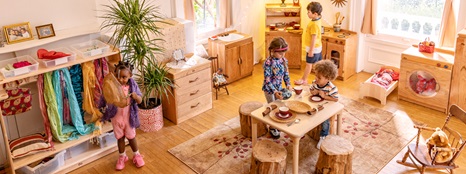Reflections
from a retired teacher
| April 2019“As a small boy I learnt by the use of the stick, so when I became a teacher I taught using the stick!”, a Nepali teacher told me. Using the stick to hit children and ensure they learn creates fear, and I saw fear in the eyes of little Nepali preschoolers being introduced into the world of education. That Nepali teacher came to Kathmandu to train as an early years teacher and discovered that little children learn through play. I had the opportunity to take him out into preschools to show him the power of play, and how the eyes of little children turn from fear to excitement in learning, without a stick in sight! Revolutionary? Perhaps, but it started me thinking….

Are there qualities that we, as more experienced learners, display when we engage with little children in their learning?
- Is the building of relationships, in which a sense of love and care is conveyed through the way we engage with children, a starting point? Is there not a reciprocal aspect to those relationships, as sometimes we lead and at other times follow in the intricate learning dance? It always seems to me that the use of the eyes is a powerful way we convey our responsiveness – in the way we engage and set up boundaries and expectations.
- Is fascination with children’s learning an important quality? It seems to me that children instinctively know when an adult takes an interest in them, and views them as powerful learners. I love seeing children grow and develop, and am constantly amazed by their curiosity and capacity to learn. Is that an intellectual and emotional satisfaction we gain from teaching?
- Surely patience is a quality we need. I am conscious, from my experience, that there are many issues that interrupt or get in the way of learning, or make learning harder for little children. Trying to understand why children behave in the way they do is taxing at times. Isn’t this where time and patience is required as we seek to understand and look for ways to help and guide children in their learning?
- Is the ability to read children’s needs an essential quality? Don’t we need to provide interesting activities that challenge, activities that match the learning and developmental needs of young children? Isn’t this a constant learning experience for us as early childhood educators?
- How do we motivate children? How do we praise and encourage them in learning? Surely the greatest reward gained in learning is the satisfaction and enjoyment it brings? I have never been an advocate of rewarding learning with chocolate! I have never liked the idea of sanctions or withdrawing toys. The ability to use humour, or to redirect children’s attention to new activities often diffuses a difficult situation. The use of the voice, the way we make eye contact, and our comments can have a powerful effect on children’s motivation to learn and to persevere with something when the going gets tough.

Only a few weeks ago, that Nepali teacher sent me an email to thank me for opening his eyes to the importance of play as the powerful and effective way children learn. After many years away studying for his MA in Early Childhood Studies, he has returned to his isolated valley on the Tibetan border with Nepal. There he will train his fellow teachers to use their sticks to light fires to keep warm – and to support learning by using play to ignite the children’s imaginations!
First published in Early Days Volume 7, issue 1. Used with permission of the author and editor.





